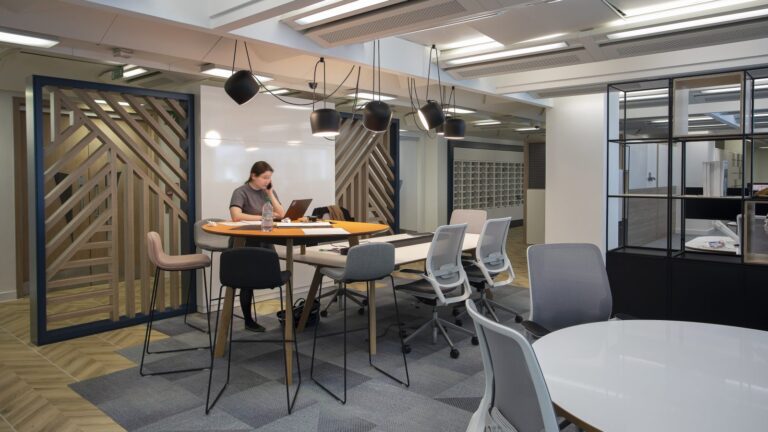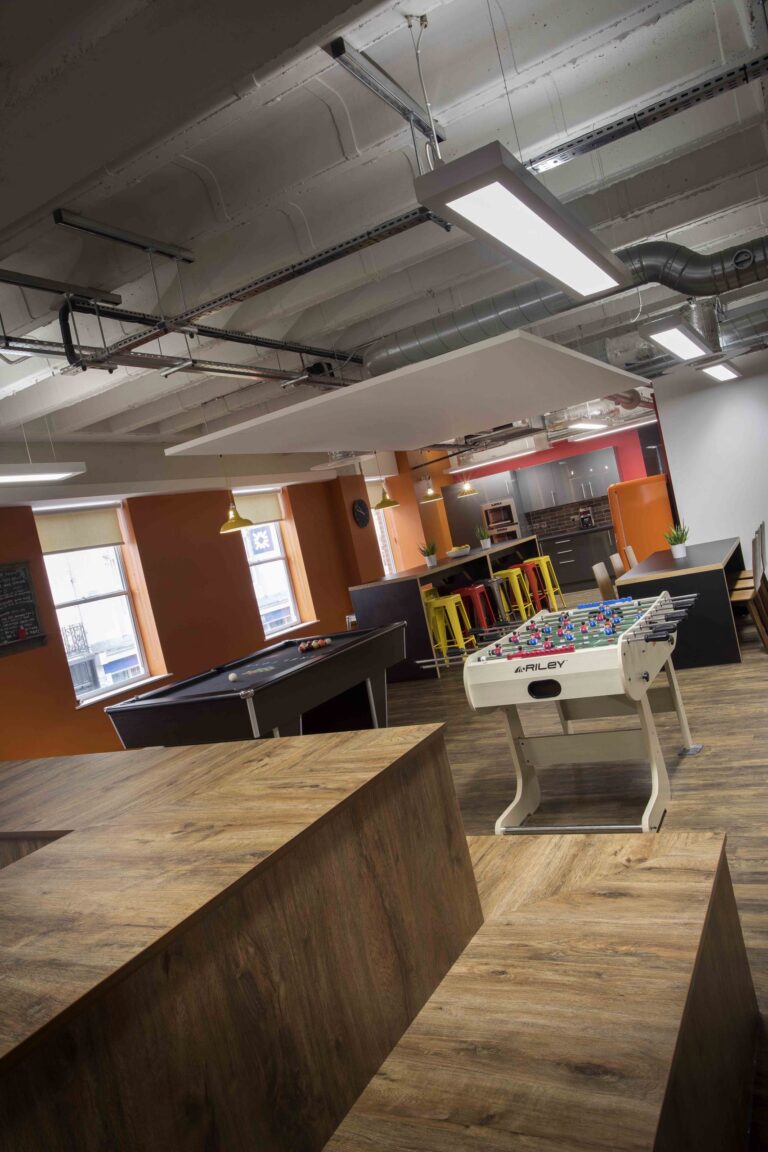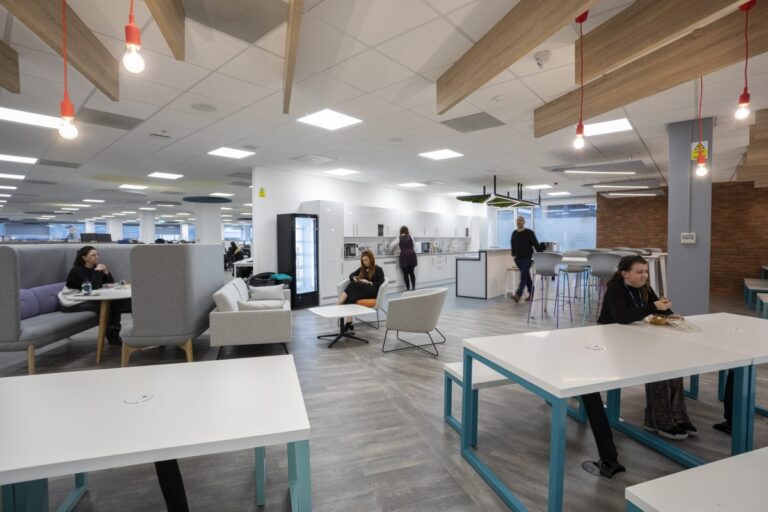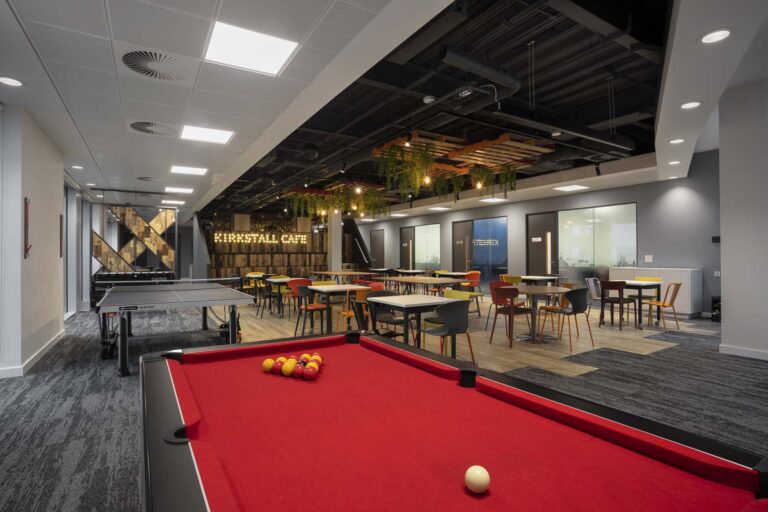
Space Matters: The Importance of Organisational Agility.
Date
27 July 2020
Read length
6 min
While FMs grapple with the realities of dealing with COVID and how to help their workplaces evolve as lockdown eases, the importance of organisational agility has been thrust firmly into the spotlight. Jon Wilson, Senior Workplace Consultant at Claremont, explains more.
While FMs grapple with the realities of dealing with COVID and how to help their workplaces evolve as lockdown eases, the importance of organisational agility has been thrust firmly into the spotlight. Jon Wilson, Senior Workplace Consultant at Claremont, explains more.
The last few months have been a master class in agility. It has been enforced on businesses of all shapes and sizes as off ices closed and employees adapted to working from home. Now, FMs are playing an integral role in helping organisations reinvent themselves for this new agile era – not just with short-term workplace fixes, but long-term solutions that act on our agile experiences and re-examine our relationship with space.
The nature of how organisations use space has been changing for some time. We’ve already had the large scale move away from cellular working in favour of open plan offices. We’ve also had the introduction of activity-based working and the use of different zones to support mobility in the workplace. Now, COVID-19 is pushing this evolution further and even the least agile-ready organisations have started to make changes.
So, what changes can we expect to see in the wake of COVID-19?
One of the biggest changes we’ll see in the short to medium term is that of more space. Right now, social distancing has had a big impact on our psyche. We’re not going to feel comfortable in a crowded lift or train for some time. At work, circulation spaces will become wider, lift capacity will be restricted, some areas may be decommissioned altogether, floor plates will be reconfigured, furniture will be moved and spacing between desks widened. New protocols will also be needed to help people enter, exit and circulate around spaces safely.
As space plans are revisited to take into account these new challenges – it’s likely to stimulate much wider discussion about spatial needs and priorities. If the majority of a 300 strong workforce can work from home, could a smaller off ice geared towards collaboration and client visits save money and present an agile alternative? In a post- COVID era, would off ices better serve as brand hubs and places of significant shared experiences – rather than just a building to provide shelter from the elements?
We fully expect to see more businesses asking these commercial, behavioural and aspirational questions and re-evaluating their needs with space utilisation studies, cost comparisons, behavioural analysis, staff surveys and new working models.
SPATIAL CHANGES.
At the point of our collective return to the office, personal space and control of that space will be important to many and this will require new things of facilities professionals. It will be a difficult balancing act as organisations seek to ride a possible bumpy recession by looking to optimise their people and property outlays. Space and the perception of space will be a priority.
Cleanliness is closely aligned with the need for space too. Not only will the workplace need to be seen to be cleaner, with regular sanitisation throughout the day, but employee etiquettes around respecting and maintaining cleanliness will have to be revisited and enforced. For some this will bring an abrupt end to the idea of shared spaces, which is particularly challenging to the ‘ours to share’ mantra of the agile office environment.
IMPROVING THE HOME OFFICE.
Although the novelty of home working may be wearing off for many, our enforced agile pilot has sped up the acceptance and necessity of remote working for
the masses. Employees with the right kit, support and training have enabled ‘business as usual’ scenarios for their organisations and FMs must now look
to turn what started as short term fixes into longer term, workable agile strategies. This will raise other challenges in relation to formalised working from home protocols, how home-working set-ups are monitored, how duty of care for employees is maintained and how IT equipment, desks and chairs are paid for and maintained.
WE ARE SOCIAL CREATURES.
After months of very limited face-to-face contact we now know the true value of socialisation. Not seeing colleagues face-to-face, no matter how good the remote communicating technology, is an issue for most businesses and FMs will now be looking at ways to make the workplace home to be a very sociable experience.
While the experience of work will remain ‘socially distanced’ for some time, we can expect to see much greater focus given to sociability and community.
The serendipitous chats at the coff ee machine, the banter and the ability to ask a quick opinion are valuable parts of the social glue that binds teams together at work. Instead of rows of desks and static work spaces, off ices will need to become places where employees choose to be for the tasks they can’t complete at home. Re-imagining the workplace as a destination will involve the use of more dynamic and interactive zones that support knowledge sharing, socialisation, collaboration and staff engagement. When this is over, we will want to reconnect with our colleagues more than ever and workplaces must respond.
Most of us will have noticed that formality has left ‘work’ over the last few months. Once you have seen your boss or a client in their kitchen with the kids interrupting or a dog barking, working relationships won’t ever be the same. Up close and personal zoom calls have helped to make intimacy become a new business necessity. The acceptance, in these most exceptional of circumstances, of a more informal, almost intimate collaboration style with clients and colleagues is helping to break down some long-held business formalities. Increasing de-formalisation in the workplace may exponentially gain traction across sectors that have previously side-stepped the idea and will lead to much flatter and less hierarchical working styles, cultures and workplaces.
MINE NOT YOURS.
We can also expect that with people less willing to share keyboards, headsets, chairs and even desks for fear of contamination – ‘owned spaces’ will become more important. In the short and medium term aft ermath of a pandemic this makes perfect sense and will hopefully be a relatively short lived departure from the normal principles of the shared agile environment. For now, belonging through ownership may change the landscape of the workplace. For some organisations this will also be the perfect excuse to tidy up the detritus of office life – freeing up valuable space and helping to improve air quality too.
Minimising contact with surfaces will also become important; powered doors, sensor taps, smartphone-controlled coff ee machines and access control systems will become more mainstream in the wake of COVID-19. Naturally bacteria-controlling and impregnated materials will be deployed where necessary to reduce infections.
A NEW SET OF WANTS.
With an enforced period of reflection, employees will have questioned the long working days, the stress, missing out on family time, time spent travelling and the sedentary behaviours associated with their previous working lives. Consequently, when they do return to the off ice their experience must be frictionless and hugely positive. For example, if a team choose to come together in the off ice to collaborate on a project – they need to know they can book seating together, they can access shared resources and that technology connects seamlessly. If they can’t, they won’t go there.
Employers must provide uplifting working experiences and make coming back to work a pleasure. Good coffee and tea, healthy snacks, a robust COVID plan, detailed long term health and mobility plans, access to natural light and fresh air and a commitment to wellbeing, are also order of the day.
The needs-must approach to organisational agility from the last few months looks set to herald a new attitude that will continue in a post-virus, recession-era business world. While business leaders prepare for an economic downturn, facilities management professionals must guide their organisations as to what’s possible when it comes to true operational agility.
Whether that decision making is motivated by cost savings or a desire to do things
differently, the process starts with taking a close-up look at workplace occupancies and behaviours as well as overheads and property commitments. The real opportunity now lies in using COVID-19 as a catalyst for proactive change that will help firms stand-out, thrive, flex and adapt to whatever change comes next.
See how we could help with your new office interior design or office design and build project here
Get in touch
We love nothing better than talking all things workplace and design – got a question, potential project or just need some guidance?
Drop us a note…




